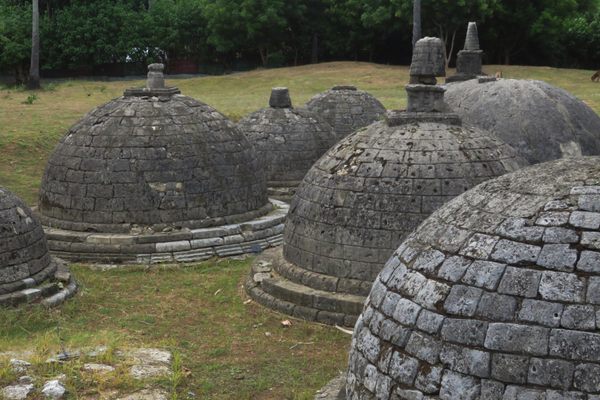Image: Tucked away among the backyards and secondary roads in the rural hamlet of Kantharodai is an archaeological site that goes by the same name. It consists of about 20 relatively small stupas (the largest is 20 feet in diameter), and they are the burial site of 60 Tamil monks-www.atlasobscura.com
(Sri Lanka Brief/11 November 2025)
Archaeology in Sri Lanka is more than the study of ruins—it is a battleground for identity, land, and power. The appointment of a new Archaeological Advisory Committee in November 2025 has reignited old controversies, drawing parallels to the Presidential Task Force on Archaeological Heritage Management in the Eastern Province, established by former President Gotabaya Rajapaksa in 2020. Both initiatives, critics argue, reflect a pattern of Sinhala-Buddhist dominance in heritage governance, sidelining Tamil and Muslim communities in regions where historical claims overlap.
The 2025 Archaeological Advisory Committee
On 1 November 2025, the government issued Extraordinary Gazette No. 2460/56, signed by Minister of Buddhasasana, Religious and Cultural Affairs Dr. Hiniduma Sunil Senevi, appointing a 19-member Archaeological Advisory Committee. Its term runs from 10 March 2025 to 9 March 2027.
The committee includes leading monks and academics, such as Venerable Wendaruwe Dharmakeerthi Sri Rathanapala Upali Nayaka Thero, Professor Senarath Dissanayake, and Emeritus Professor Jagath Weerasinghe. Its mandate under the Antiquities Ordinance is to advise on archaeological policy, site preservation, and cultural heritage management.
The Controversy
The composition—entirely Sinhalese—has sparked criticism. Tamil political leaders and civil society groups argue that archaeology in the North and East cannot be managed without inclusive representation, given the region’s multi-ethnic history. Allegations persist that the Department of Archaeology prioritises Buddhist sites, while Tamil claims to ancient Hindu temples and cultural landscapes are ignored. For communities still recovering from decades of war, heritage decisions are inseparable from land rights and identity.
Gotabaya’s 2020 Presidential Task Force
In June 2020, then-President Gotabaya Rajapaksa appointed the Presidential Task Force for Archaeological Heritage Management in the Eastern Province, chaired by Defence Secretary Major General (Retd.) Kamal Gunaratne. Its 11 members included senior officials and Buddhist clergy—but no Tamil or Muslim representatives, despite these communities forming the majority in the Eastern Province.
Mandate and Actions
The Task Force was empowered to:
-
- Identify and protect archaeological sites.
- Recommend land allocation for heritage preservation.
- Coordinate with security forces for site protection.
Officially, the rationale was to safeguard Buddhist heritage allegedly under threat. However, Tamil leaders viewed it as a state-backed project to assert Sinhala-Buddhist dominance. Reports emerged of farmers being barred from cultivating ancestral lands in Trincomalee’s Thiriyai area and other locations after interventions by the Task Force. Civil society groups warned that archaeology was being weaponised to redraw demographic and cultural maps.
Members of the AKD committee:

Patterns and Implications
Both the 2020 Task Force and the 2025 Advisory Committee share key characteristics:
- Exclusionary Composition: Dominated by Sinhalese members, with no Tamil or Muslim representation.
- Focus on Buddhist Heritage: Prioritisation of sites linked to Sinhala-Buddhist history, often in contested regions.
- Political Sensitivity: Decisions on heritage intersect with land ownership, resettlement, and reconciliation.
For Tamil communities, these moves reinforce fears of Sinhalisation through heritage policy. Archaeology becomes a tool not just for preservation but for territorial claims, influencing settlement patterns and political narratives.
Why This Matters
Sri Lanka’s post-war reconciliation hinges on inclusive governance. Heritage management cannot be divorced from ethnic politics. As the country seeks stability, experts argue for:
- Multi-ethnic representation in heritage bodies.
- Transparent processes for site identification and land allocation.
- Community consultation to prevent archaeology from becoming a flashpoint for conflict.
Without these safeguards, committees like the 2025 Advisory body risk deepening mistrust and undermining efforts at national unity.
From Gotabaya’s Task Force in 2020 to the Advisory Committee in 2025, the story is one of continuity: state-led archaeology framed as cultural protection but perceived as political assertion. In a country where ruins are not just relics but symbols of belonging, the question remains—can Sri Lanka manage its heritage without reigniting old wounds?
©SLB
